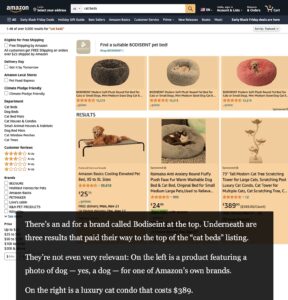Tech Reporter at Bezos-Owned Washington Post Blasts Amazon: ‘Betraying Your Trust’ to ‘Make an Extra Buck’

Photo by Ethan Miller/Getty Images.
Amazon is “betraying your trust” by loading search results with misleading ads, wrote tech reporter Geoffrey Fowler. And he did so on the pages of the Washington Post, owned by Amazon founder Jeff Bezos.
“Amazon founder Jeff Bezos owns The Washington Post, but I review all tech with the same critical eye,” Fowler wrote about his paper’s owner, and his article pulls no punches in condemning the online retail giant for how it presents and organizes search results for customers.
“It’s not your imagination: Shopping on Amazon has gotten worse,” is the headline of Fowler’s interactive article, in which he laid out how Amazon is filling search results with sponsored products, some from its own product lines and some from retailers who have paid to promote their wares.
“When you search for a product on Amazon, you may not realize that most of what you see at first is advertising. Amazon is betraying your trust in its results to make an extra buck,” wrote Fowler.
As an example, Fowler searched for “cat beds” and Amazon served up all ads in the first page of search results, as shown in the screenshot below (orange highlighting added by the Post):

Screenshot via Washington Post.
The sponsored results were “not even very relevant,” Fowler noted, as they included an Amazon-brand dog bed and a $389 “luxury cat condo.” (As a cat owner myself, I can attest that I’m definitely not looking to spend almost $400 on a cat condo if I’m searching for a cat bed, but then again, my orange tabby is fine with various piles of blankets.)
Even listings that were labeled “Highly rated” were still just more ads, according to Fowler. Out of the first five screens, “more than 50 percent of the space was dedicated to ads and Amazon touting its own products,” he found, and the problem isn’t limited to just cat products:
The first page of Amazon results includes an average of about nine sponsored listings, according to a study of 70 search terms conducted in 2020 and 2021 by data firm Profitero. That was twice as many ads as Walmart displayed, and four times as many as Target.
Amazon might feel unbeatable for service, fast shipping and easy returns. But as a place to find products, it’s becoming a tacky strip mall filled with neon signs pointing you in all the wrong directions.
Customers want informative and helpful search results, Fowler argued, and “some common-sense limits on ads that are designed to deceive,” slamming Amazon for being in the business of “shill results.”
“Even when they contain a tiny disclaimer label — as do Amazon’s — these kinds of ads can be misleading because they fill up spaces people have every reason to expect to contain trustworthy, independent information,” he continued, and the problem is growing as other apps and websites are following Amazon’s shady example.
Amazon didn’t always operate this way. Fowler showed an example from archived Amazon pages how the site produced far more relevant results, with less prominent ads, in a 2015 search for “4k tv” compared to today.
The tech reporter went so far as to call Amazon’s ads “deceptive,” noting how many brands engage in “conquesting,” or paying for their products to be promoted in searches for a competitor brand, and how the labels Amazon uses mislead customers to believe the designated products have been endorsed or evaluated as high-quality.
Fowler ended the article by urging consumers to begin their shopping on “Google and trusted reviews sites” rather than relying on Amazon’s recommendations to make their decisions, looking out for the markers that indicate a search result is an ad, and advocates for the Federal Trade Commission to update their guidelines on how sponsored content should be labeled.
Read Fowler’s interactive article at the Washington Post here.
New: The Mediaite One-Sheet "Newsletter of Newsletters"
Your daily summary and analysis of what the many, many media newsletters are saying and reporting. Subscribe now!






Comments
↓ Scroll down for comments ↓